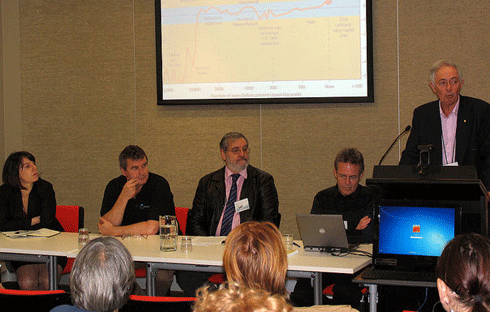
|
Published: 22 August 2011
Unions take a stand for climate science
With their networks into the workplace and a long history of collective action, trade unions have been raising awareness among Australian workers about climate change, the supporting science and new job opportunities.

|
|
ACTU President, Ms Ged Kearney, recently visited the CSIRO Marine and Atmospheric Research labs in Hobart to promote a new ACTU information kit on climate change issues.
Credit: Climate Connectors
|
Trade unions have teamed up with the Australian Conservation Foundation (ACF) in a campaign called Climate Connectors, which is designed to raise environmental awareness and encourage action among workers in different industries.
‘Unions respect the science of climate change and recognise the threat to our environment and economy if no action is taken,’ says Ms Ged Kearney, president of the Australian Council of Trade Unions (ACTU).
‘The task of shifting to a low-carbon economy is urgent and we must act now to take advantage of the investment opportunities for our future.’
More than 2600 union members have signed up as volunteer Climate Connectors.
As well as attending workshops, volunteers are provided with information kits that cover issues such as water, energy, food and the economy, and provide clear explanations of the science behind climate change. The program also makes use of Facebook, Twitter and YouTube to keep participants informed.
Dr Simon Bradshaw, climate change campaigner with the ACF, believes Climate Connectors members play an important role in cutting through misinformation about climate change.
‘The message is more effective if it comes from friends and colleagues,’ he says.
This view is supported by CSIRO’s Ms Peta Ashworth, who has been researching public attitudes to climate change.
In her report, Communication and climate change: What the Australian public thinks 1 , Ms Ashworth found that people most trust scientifically based sources of climate change information (CSIRO was rated as the most trustworthy), followed by family and friends.
Australian Manufacturing Workers Union (AMWU) environment officer, Ms Colleen Gibbs, finds the real change in attitude comes when she talks face to face with members.
‘I give them the facts and explain it,’ she says. ‘The half hour turns into an hour, or an hour and a half. Once they talk it out, they are not afraid of it anymore. A lot only hear about [climate change] in the news, which has been negative.’
Ms Gibbs was part of a union Climate Connectors group that met with 53 ministers, senators and other members of parliament in Canberra last year to put the case for a stronger response to climate change.
Positive perspective on jobs
Like the ACTU’s current Climate Change and Jobs workplace campaign, the Climate Connectors’ campaign argues that given the right policies and approach, climate change action will create better long-term employment prospects than taking no action.
A report from the ACTU and the ACF called Creating Jobs — Cutting Pollution: the roadmap for a cleaner, stronger economy 2 says that by taking strong action now, Australia could create more than 770 000 extra jobs by 2030.
The report calls for investment in low-emissions industries, and the development of ‘green’ skills and training programs for workers. It says Australia needs to take prompt and decisive action to remain competitive and benefit from the global clean energy economy.
‘We really see this as an opportunity to do something big for our country as well as our economy,’ says the ACTU’s Ms Kearney.
‘We will be visiting workplaces to talk to workers and tell them straight up what the facts are and to stop the fear-mongering.’
According to Tim Chapman from the Amalgamated Metal Workers Union (AMWU), government policy should aim at achieving emissions reduction goals through supporting clean energy technologies such as wind turbines and solar panels in Australia: ‘because that’s where the manufacturing jobs of the future are’.
The AMWU would like to see 3 grants and cost-sharing arrangements for researchers, entrepreneurs and startup firms to trial, demonstrate and commercialise low-emission technologies, as well as a co-investment scheme for large, capital-intensive prototypes and early stage commercial facilities for technologies such as next-generation biofuels.
Supporting a carbon price
Climate Connectors’ Price on Pollution action kit argues the case for ‘yes’ to a price on pollution.
The ACTU, which conditionally supports a price on carbon as a pollution-reduction mechanism, is a member of the community consultative roundtable that the Gillard government set up in the process of establishing a price on carbon.
‘The polls don’t indicate a lot of support [for the carbon pricing package], but there is not a lot of information [available],’ says Ms Catherine Davis, the Australian Education Union representative on the ACTU’s climate action group — a group of senior union officials who gather regularly to talk about how unions will tackle the problem of climate change.

|
|
Unions march in support of the Say ‘Yes!’ to climate action campaign in June.
Credit: Climate Connectors
|
‘In one poll, a lot of people didn’t know that compensation existed. We need to continue to educate members and the community,’ says Ms Davis.
‘Unions have a two-pronged approach. Climate Connectors is producing information about waste management and what green jobs look like. But big-ticket reform is also necessary. Behaviours of individuals won’t be enough. Australia needs to restructure if it is to compete in a green global economy.
‘This package is a big shift that people need to understand. Unfortunately, the media has put its weight behind the anti-campaign, so there is misinformation and confusion.’
The ACTU has produced fact sheets about the price on carbon and what new green industries look like. They are also holding a fortnight of action for people to understand why unions are ‘saying yes’.
|
The CSIRO’s representative union body, the CSIRO Staff Association, supports Science and Technology Australia’s (STA) Respect the Science campaign. |
‘We are more interested in explaining what the science is about, rather than lobbying,’ says Dr Michael Borgas, president of the CSIRO Staff Association. |
‘There is a certain amount of disrespect levelled towards scientists in the climate change debate. Scientists have had run-ins with political forces that oppose [the idea of] climate change. We are here to advocate the integrity of CSIRO scientists. We will defend any attacks and defend the integrity of CSIRO. |
‘Our role is advocacy around the science of climate change. We need to make sure that the science maintains its integrity to protect it against the attacks. We don’t run policy prescriptive lines. We report the facts and avoid outlining social solutions. However, we do have strong support among our members for [environmental] advocacy groups. |
‘As part of the Respect The Science campaign, we organised activities such as distributing leaflets explaining the science when Lord Monckton, Lord Lawson and Václav Klaus, President of the Czech Republic, spoke in Melbourne,’ says Dr Borgas. |
An STA survey found overwhelming public interest in climate change. Dr Borgas says scientists are engaging in a more public way on the issue. |
‘We are keen on opening up the science to the public,’ he says. |
More information
Climate Connectors, www.climateconnectors.org
Respect the Science, http://respectthescience.org.au/
1 p.38, http://www.csiro.au/resources/Climate-Change-Book--ci_pageNo-14.html
2 www.acfonline.org.au/uploads/res/ACF_Jobs_report_190510.pdf
3 www.amwu.org.au/content/upload/files/report/AMWU_LEITDF-Summary-110527.pdf




